Using the Iterable API to Create or Update Users (with Python examples)

Introduction to Iterable API for User Management
Iterable is a powerful cross-channel marketing platform that enables businesses to create, execute, and optimize campaigns across email, push notifications, SMS, and more. Its robust API allows developers to seamlessly integrate and manage user data, enhancing personalized marketing efforts.
By integrating with Iterable's API, developers can efficiently manage user data, such as creating or updating user profiles, to ensure that marketing campaigns are targeted and relevant. For example, you might want to update user preferences based on their interactions with your app, ensuring they receive the most relevant content and offers.
Setting Up Your Iterable Test Account for API Integration
Before you can start using the Iterable API to create or update users, you need to set up a test account. This will allow you to safely experiment with API calls without affecting your production data.
Creating an Iterable Test Account
If you don't already have an Iterable account, you can sign up for a free trial on the Iterable website. This trial will give you access to the platform's features, including the API.
- Visit the Iterable website and click on the "Get Started" button.
- Fill out the registration form with your details and submit it to create your account.
- Once your account is set up, log in to access the Iterable dashboard.
Generating an API Key for Iterable
To authenticate your API requests, you'll need an API key. Iterable uses API key-based authentication, which is straightforward to set up.
- In the Iterable dashboard, navigate to the "Integrations" section.
- Select "API Keys" from the menu.
- Click on "Create New API Key" and provide a name for your key, such as "Test API Key".
- Set the permissions required for your use case. For creating or updating users, ensure you have the necessary permissions enabled.
- Click "Save" to generate your API key. Make sure to copy and store it securely, as you'll need it for API requests.
Configuring Your Development Environment
With your API key ready, you can now configure your development environment to interact with the Iterable API using Python.
- Ensure you have Python 3.11.1 installed on your machine. You can download it from the official Python website.
- Install the necessary Python package by running the following command in your terminal:
pip install requestsThis will allow you to make HTTP requests to the Iterable API.

sbb-itb-96038d7
Making API Calls to Create or Update Users with Iterable API in Python
To interact with the Iterable API for creating or updating users, you'll need to make HTTP requests using Python. This section will guide you through the process, including setting up your environment, writing the code, and handling responses.
Setting Up Your Python Environment for Iterable API Integration
Ensure your Python environment is ready to make API calls to Iterable. You'll need Python 3.11.1 and the requests library installed.
- Verify Python installation by running
python --versionin your terminal. - Install the
requestslibrary if not already installed:
pip install requestsWriting Python Code to Create or Update Users in Iterable
With your environment set up, you can now write the Python code to interact with the Iterable API. Below is an example of how to create or update a user profile.
import requests
# Define the API endpoint and headers
url = "https://api.iterable.com/api/users/update"
headers = {
"Content-Type": "application/json",
"Api-Key": "Your_API_Key"
}
# Define the user data
user_data = {
"email": "example@domain.com",
"dataFields": {
"firstName": "John",
"lastName": "Doe"
}
}
# Make the POST request to create or update the user
response = requests.post(url, json=user_data, headers=headers)
# Check the response status
if response.status_code == 200:
print("User created or updated successfully.")
else:
print(f"Failed to create or update user: {response.json()}")Replace Your_API_Key with the API key you generated earlier. The user_data dictionary contains the user information you want to create or update.
Handling Responses and Errors from Iterable API
After making the API call, it's crucial to handle the response correctly. Check the status code to verify if the request was successful. A status code of 200 indicates success, while other codes may indicate errors.
- For successful requests, you can proceed with further actions, such as logging or notifying the user.
- For errors, examine the response to understand the issue. Common error codes include 400 for invalid parameters and 401 for invalid API keys.
For more details on error codes, refer to the Iterable API documentation.
Verifying User Creation or Update in Iterable
To ensure that the user was created or updated successfully, you can verify the changes in your Iterable dashboard. Navigate to the user management section and search for the user's email or user ID.
By following these steps, you can efficiently manage user data in Iterable, enhancing your marketing campaigns with personalized content.
Conclusion and Best Practices for Using Iterable API for User Management
Integrating with the Iterable API to manage user data can significantly enhance your marketing campaigns by ensuring personalized and relevant content delivery. By following the steps outlined in this guide, you can efficiently create or update user profiles, leveraging Iterable's robust platform to optimize your marketing efforts.
Best Practices for Secure and Efficient API Integration with Iterable
- Secure API Key Storage: Always store your API keys securely. Avoid hardcoding them in your source code. Use environment variables or secure vaults to manage sensitive information.
- Handle Rate Limits: Be mindful of Iterable's rate limits to avoid throttling. Implement retry logic with exponential backoff to handle rate limit errors gracefully.
- Data Standardization: Ensure consistent data formats when updating user profiles. This helps maintain data integrity and prevents errors related to mismatched data types.
- Error Handling: Implement comprehensive error handling to manage API response codes effectively. Log errors for troubleshooting and consider notifying relevant teams for critical issues.
Enhancing Integration Efficiency with Endgrate
While integrating with Iterable's API can be straightforward, managing multiple integrations across different platforms can become complex. Endgrate simplifies this process by providing a unified API endpoint for various platforms, including Iterable. By using Endgrate, you can:
- Save time and resources by outsourcing integration management, allowing your team to focus on core product development.
- Build once for each use case, reducing the need for multiple integrations and streamlining your development process.
- Offer an intuitive integration experience for your customers, enhancing their interaction with your platform.
Explore how Endgrate can transform your integration strategy by visiting Endgrate's website.
Read More
Ready to get started?
